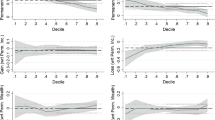Abstract
Musgrave develops the concept of the “target saver,” in which the household saves in the present in order to finance a target level of consumption outlays in the future. The resulting household behavior is one in which a rise in the rate of interest in the present period reduces the amount of saving needed for future consumption, so that household saving is inversely rather than positively a function of the interest rate. The present study examines the potential implications of the target saver in the aggregate for macroeconomic stability and economic policy effectiveness.
Similar content being viewed by others
References
Carlson K, Spencer W (1975) Crowding out and its critics. Federal Reserve Bank of St. Louis Review 57:1–16
Greenspan A (2007) The age of turbulence. Penguin Books, London
Metzler L (1951) Wealth, saving, and the rate of interest. J Polit Econ 59:93–116
Musgrave R (1959) The theory of public finance. McGraw-Hill, New York
Weber W (1970) The effects of interest rates on aggregate consumption. Am Econ Rev 60:591–600
Weber W (1975) Interest rates, inflation, and consumer expenditures. Am Econ Rev 65:843–858
Author information
Authors and Affiliations
Corresponding author
Rights and permissions
About this article
Cite this article
Cebula, R.J., Menon, S. Musgrave’s “target saver” theory: Implications for macroeconomic stability and economic policy effectiveness”. J Econ Finance 32, 426–433 (2008). https://doi.org/10.1007/s12197-008-9032-8
Published:
Issue Date:
DOI: https://doi.org/10.1007/s12197-008-9032-8




